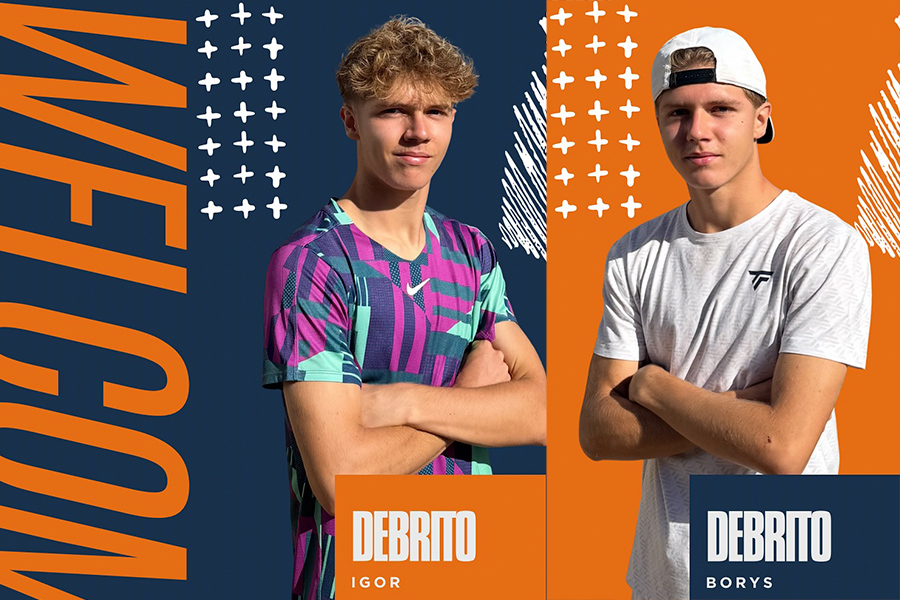
Inside Tennis
Welcome to the Debrito twins at Barrère Academy
Welcome to the Debrito twins at Barrère Academy
Barrère Academy is delighted to welcome two promising young talents: the Debrito twins, who have just joined us from Angers. Their arrival marks the beginning of an exciting new sporting adventure.
Two brothers, one passion
Born in 2009, the Debrito twins share more than just family ties: a genuine family passion for tennis. Since their very first steps on a court, they have trained side by side, encouraging and motivating each other to give their best.
Their bond and competitive spirit are valuable assets, both personally and athletically.
Promising rankings
At only 15 years old, the twins already show impressive results. One is ranked 4/6 and the other 2/6, achievements that reflect their discipline, dedication, and potential. These rankings are a solid foundation for further progress toward higher levels of competition.
Their journey demonstrates how determination and proper guidance can help young players reach milestones quickly.
Motivation at its best
What stands out most about the Debrito brothers is their unwavering motivation. Always bringing energy and enthusiasm to training, they embody the spirit we promote at Barrère Academy: passion, hard work, and perseverance.
Their attitude inspires fellow players and brings fresh momentum to the group. Their arrival is a true asset to the academy’s collective dynamic.
A new chapter begins
For the Debrito twins, joining Barrère Academy is a key step in their sporting journey. Here, they will benefit from professional coaching, personalized support, and an environment designed for growth and development.
We look forward to watching them evolve, improve, and face the challenges that lie ahead on their path to competition.
See you on court
This season will be the perfect opportunity to follow the progress of these two young talents. The entire Barrère Academy team wishes them a warm welcome and much success in this new stage.
👉 Discover all our news and follow our young talents at https://www.barrere-academie.com/en/inside-tennis-the-news.
What are the essential physical aspects I need to develop to succeed as a professional player of tennis ?
Speed, agility, strength, endurance and flexibility are all crucial physical aspects to develop. Working on these elements will help you be more competitive on court.
How to effectively manage the stress and pressure of important competitions?
Practicing breathing techniques, visualization and pre-match routines can help manage stress. Additionally, focusing on controlling what you can influence and staying in the present moment can reduce the pressure you feel.
What is the best way to structure my training to maximize my progress?
Establishing clear goals, diversifying training types (physical, technical, mental) and working collaboratively with an experienced coach can all contribute to an effective training structure.
What sacrifices will I have to make to pursue a career in professional tennis?
Sacrifices may include compromises on free time, hobbies, and personal relationships. It may also be necessary to give up certain lifestyle habits that could negatively affect performance, such as an unhealthy diet or risky behaviors.
How do I balance my studies and training as a young aspiring professional tennis player?
Planning your schedule wisely, communicating effectively with teachers and coaches, and using effective learning strategies can help balance studying and training.
What are the ideal eating and sleeping habits to optimize my performance on court?
A balanced diet, rich in nutrients and hydration, combined with sufficient and quality sleep, is essential to maintain high energy levels and promote muscle recovery.
How can I improve my concentration and focus during matches?
Practicing mindfulness, developing pre-match routines and using attention reorientation techniques can all help improve concentration and focus during matches.
What is the best approach to developing a strong and resilient mental game?
Working with a mental coach, practicing positive visualization, building self-confidence, and learning to manage negative thoughts and emotions are all components of a strong and resilient mental game.
What are the key things to consider when choosing a coach or training team?
Experience, qualifications, personality, coaching philosophy and the ability to build trust and effective communication are all important factors to consider.
How can I stay motivated and persevere despite defeats and obstacles on the path to becoming a professional tennis player?
Focusing on progress rather than immediate results, setting realistic and meaningful goals, finding sources of inspiration and support, and cultivating a growth mindset can all help maintain motivation and perseverance.
Which tournaments and competitions should I target to gain experience and improve my ranking?
Target tournaments suited to your level of play and your short- and long-term goals, while seeking to face competitive opponents to progress.
How can I effectively manage injuries and prevent recurrence while continuing to progress in my career?
Working closely with medical professionals, following an appropriate rehabilitation program, listening to your body and taking a proactive approach to injury prevention are all essential measures.
What are the most effective strategies for establishing a support network, including potential sponsors and training partners?
Participating in social and sporting events, cultivating authentic professional relationships, creating quality content on social media, and seeking sponsorship and partnership opportunities can all help build a strong support network.
How can I use online resources and new technologies to improve my game and training?
Exploring educational videos, mobile apps, online training platforms and performance tracking tools can provide access to a wealth of information and resources to improve play and training.
p>What career opportunities outside of the professional tennis circuit could I consider as an athlete?
Opportunities include coaching, commentary, teaching, mentoring, sports marketing, event management and community program development. Exploring these options can offer interesting avenues for a rewarding career after professional competition.
 EN
EN  FR
FR